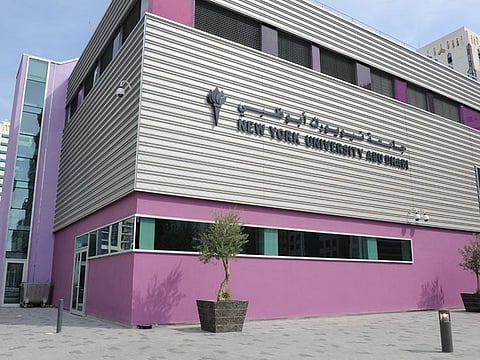New York University Abu Dhabi sets up three more research centres to study water, human behaviour and art
Centres will aim to advance knowledge and address challenges in respective fields

Abu Dhabi: On its tenth anniversary, New York University Abu Dhabi (NYUAD) has launched three new research centres focused on water research, human behaviour, and art and art history.
The Water Research Centre, the Centre for Behavioural Institutional Design and the Arab Centre for the Study of Art will join the institution’s 16 other research centres to advance knowledge in their respective fields.
The Water Research Centre (NYUAD-WRC) will focus on the critical role of water, which is linked to many global societal issues such as health, food security, the economy and public policy. Growing scarcity demands novel solutions for managing existing water resources and increasing supply, which are also some of the objectives of the UAE Water Security Strategy 2036. NYUAD-WRC will be led by Engineering professor, Dr Nidal Hilal, along with co-principal investigators, Mechanical Engineering professor, Dr Raed Hashaikeh, Chemistry programme head and Chemistry associate professor, Dr Ali Trabolsi, and Environmental Studies programme head and Biology associate professor, Dr John Burt.
“The NYUAD-WRC will seek to place the UAE in a leading position for cutting-edge research and development in water technologies, in line with the country’s vision for water security and the efficient use of resources,” Dr Hilal said.
The Center for Behavioural Institutional design (CBID) will be led by principal investigators Global Network Economics professor, Dr Nikos Nikiforakis, and Global Network Economics professor, Dr John Wooders, along with co-principal investigators, Economics associate professor, Dr Olivier Bochet and of Economics associate professor, Dr Ernesto Reuben.
The long-term goal is to construct empirically validated models of human behaviour, using them to design and implement policies and institutions that will improve social welfare. “The potential public and societal impact of CBID is clearly substantial at a time when the Abu Dhabi government is looking to incorporate insights from behavioural social science in policymaking and establish a Behavioural Unit,” Dr Nikiforakis said.
The new Arab Centre for the Study of Art will build upon recent calls to decentre cultural histories and social theory. It will move both research and pedagogy beyond the established canons of art history by investigating the histories of art from the region. It will be led by principal investigator, Practice of Art History associate professor, Dr Salwa Mikdadi, and co-principal investigators, Literature and Art History professor, Dr Shamoon Zamir, and Social Research and Public Policy assistant professor, Dr May Al-Dabbagh.
“We aim to become a major resource and contributor to the study of art of the Arab World and the cultural exchange with countries in Western Asia. The Centre’s programme and research projects will contribute to a theoretical framework that is grounded in the region’s culture for teaching at the undergraduate and graduate level,” Dr Mikdadi said.






